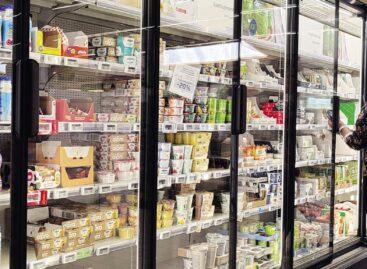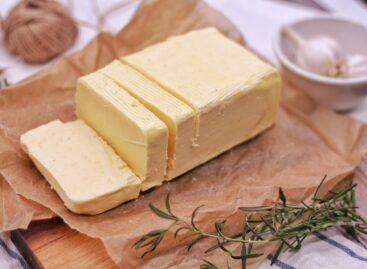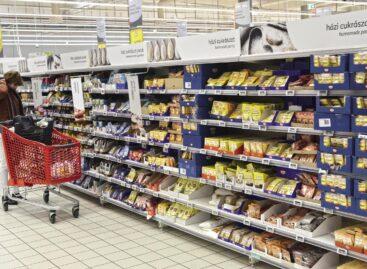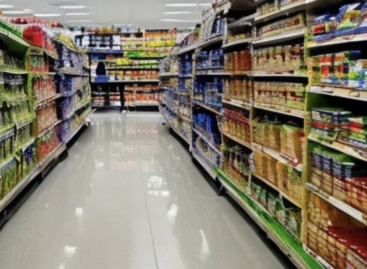Hard times
In the butter market, the situation returned to normal by the summer, with retail prices starting to decrease again.
This article is available for reading in Trade magazin 2023/12-01
“In the light of the current market recovery, we are optimistic about the end of the year, which is a key period for Lurpak”, says Noémi Papp-Mile, brand manager of Foodnet Zrt. She added that just like in every category, price promotions and the private label (PL) products of retail chains play a key role. Among branded products sales of Hungarian, lower-priced products are growing more strongly.
Quality has its price

Jaroslav Horváth
managing director
Meggle Hungary
Behind MEGGLE there is 130 years of technological development, which means that their butter products – made in Germany – not only taste great, but also have a long shelf life. But this comes at a price: in the current inflationary market, they can’t compete with the leading brands in terms of price. “We accept this situation and compensate for the profit loss in other product groups, for instance in the cream category, where we are the market leaders”, says Jaroslav Horváth, managing director of Meggle Hungary Kft.
One of the characteristics of the Hungarian market is that both domestic and foreign producers offer a wide range of products, despite the low consumption level – 1.5 kg of butter and dairy spread per capita per year, compared with 3.9 kg in Slovakia, 5.4 kg in the Czech Republic, and 4.9 kg in Austria. This difference can be explained mainly by the significantly higher consumption of vegetable fat-based products, which is a typical Hungarian phenomenon.
Planning with new flavours
Among the sandwich-making products we also find processed cheese spreads, sales of which have been negatively affected by the rise in dairy prices.

András Lengyel
managing director
ERU Food
“If customers have less money to spend in real terms, they will either look for cheaper products within the segment or put less in their baskets in terms of volume”,
says András Lengyel, managing director of ERU Food Trading Kft.
When developing new products, the company tries to listen to market needs and find niche markets. Their strategy is to introduce flavours that are new in a given category, but not too extreme. This is how the Camping Cheddar product was born, with a flavour that has already been proven in the toast cheese slices category.
Hungarians bought less dairy, cheese and sandwich spread, cottage cheese and Liptauer

Guest writer:
Misheel Baigalkhuu
junior analytic insights
associate
NielsenIQ
Dairy spread: according to the NIQ retail index, Hungarian consumers purchased 2,000 tonnes of dairy spread for HUF 6.5bn, 7% less in value and 32% less in volume between October 2022 and September 2023, compared to the same period last year. Private label (PL) products gained ground: their value share rose from 54% to 71%. PL products cost HUF 2,700 and we had to pay HUF 3,800 for branded dairy spreads per kilogram.
Cheese and sandwich spreads: cheese and sandwich spread sales grew by 25% in value, but at the same time volume sales fell by 6%, with 5.5 thousand tonnes of products worth HUF 15.5bn ending up in the shopping baskets. After a 33% price rise, the average price paid for a kilogram of cheese and sandwich spreads was HUF 2,900. The value share of manufacturer brands was up 5 percentage points at 48%.
Körözött (Liptauer): over the period under review, more than HUF 1bn was spent on Liptauer – this was an increase of 4%. However, there was a 27% sales drop in volume. Following a 5 percentage point increase, PL products accounted for 41% of sales. The average price per kilogram was HUF 2,700 for private labels and HUF 4,500 HUF for branded products.
Cottage cheese: the nearly HUF 1.5bn market for cottage cheese was characterised by an 11% increase in value and a 21% fall in volume over the last 12 months. Sales of branded products – which cost an average of HUF 4,100/kg also fell in value and volume (by 4% and 38%, respectively). As a result, private labels with an average price of HUF 2,300/kg pushed forward. //
Related news
Plant-based foods are taking over
Both manufacturers and distributors in the plant-based segment are trying…
Read more >Dairy consumption falls again in Germany
Consumption fell to a new low in 2023, the data…
Read more >Related news
BH AgrárTrend Index: the outlook for the Hungarian food industry has stabilized
The assessment of the situation of the actors of the…
Read more >Shrink inflation is getting worse
Dishwashing detergent, sweets, sour cream, cottage cheese, kefir and camembert…
Read more >NGM: innovation means the future of the food industry, State Secretary Gergely Fábián handed over new developments
In the framework of the Food Supplier Development Program (ÉLIP…
Read more >








